By Cristina Cabrera Jarro -
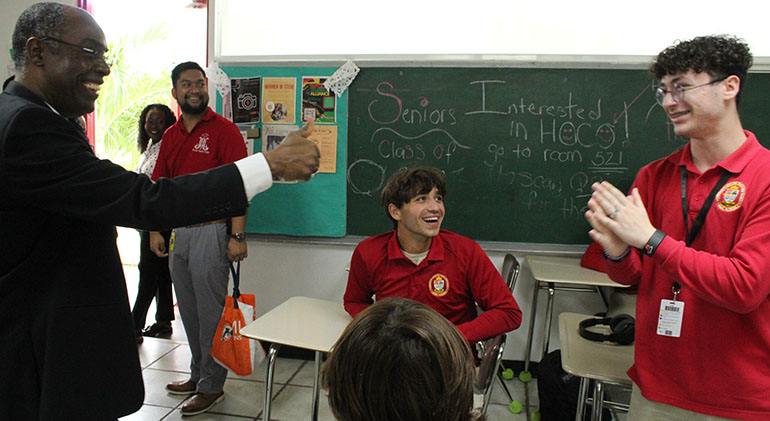
Photographer: CRISTINA CABRERA JARRO| FC
Bishop Charles Peters Barthélus of Port-de-Paix, Haiti, gives a thumbs up to Msgr. Edward Pace High student Kenneth Martinez during his visit to the Miami Gardens school on Sept. 14, 2022. In his best efforts to welcome the bishop, Kenneth greeted him in Creole and spoke a few basic phrases.
MIAMI GARDENS | For $3, students at Msgr. Edward Pace High School can purchase a world of a difference for their sister schools in Port-de-Paix, Haiti.
That’s because $3 buys them a cup of fair trade “Just.Ice.Coffee” brewed from Café Cocano, a bean that is sustainably grown in Port-de-Paix, Haiti, and sold daily at Pace’s on-campus pop-up coffee shop.
During the school’s annual Campus Ministry Kick Off Week, known as CAMINKOW, a few bucks also bought a pass for a dress-down day; a registration fee for Hoops for Haiti; a basketball free-throw contest with a gift-card prize for the winner; a snackable mango with a spicy kick of chamoy and tajin, and more.
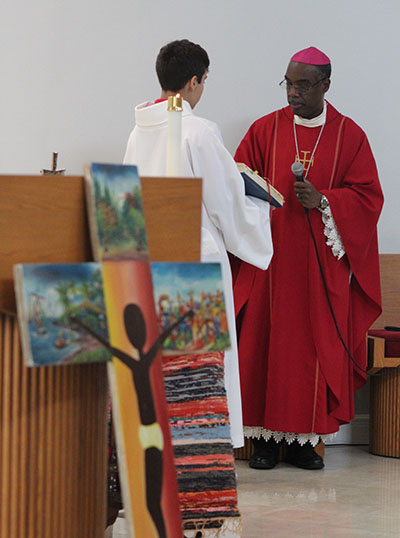
Photographer: CRISTINA CABRERA JARRO| FC
Bishop Charles Peters Barthélus of Port-de-Paix, Haiti, celebrates Mass at the Dante Navarro Chapel at Msgr. Edward Pace High in Miami Gardens on Sept. 14, 2022. Afterwards he toured the school and visited students and faculty, thanking them for supporting their sister schools in Haiti.
Students raised over $1,500 during the September event.
“It doesn’t seem like a lot, but if you have enough [fundraisers] throughout the year, it adds up,” said Andres Novela, director of campus ministry and a theology teacher at the school.
Annually, Pace raises between $25,000 and $30,000 for its sister schools in Pewou, Lormand, and Moulin, all located in the remote northwestern Diocese of Port-de-Paix. It costs between $4,000 and $5,000 a year to sustain each of the schools, with the funds distributed between teacher salaries and a basic nutrition program.
“We remind our students and our faculty that this is where your money is going, and this is how it’s changing lives, or helping support the work that is being done in our sister schools and our sister diocese. It’s a constant education. Without that piece, they don’t connect the dots. They just see it as another school fundraiser,” said Novela.
Over 30 years ago, the Archdiocese of Miami and the Diocese of Port-de-Paix established a “sister diocese” relationship, with Amor en Accion, a lay missionary community founded in Miami, functioning as a liaison between the two. Amor en Accion, which does work in the Dominican Republic as well, partners with 16 Catholic schools in the archdiocese to educate students on mission work and supporting their peers in Haiti.
Mission is part of the culture at Pace. Even before incoming students arrive for their first day of high school, the campus ministry program evangelizes by sharing photos and video of the sister schools and diocese at open house presentations and other events.
“We want them to know, even before they enter our school, that that’s who we are,” said Novela.
Campus ministry also brings in guest speakers from Amor en Accion to speak about mission, a word and concept that Novela explains has a bad reputation: one linked to the stereotype of “beating people over the head with God, and a cross, and trying to save them.”
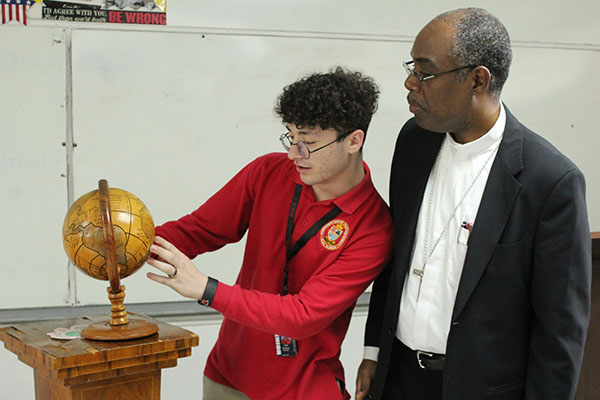
Photographer: CRISTINA CABRERA JARRO| FC
Msgr. Edward Pace High student Kenneth Martinez searches for Haiti on a globe alongside Bishop Charles Peters Barthélus of Port-de-Paix, who visited the Miami Gardens school on Sept. 14, 2022.
“It’s not that. It’s walking with others; it’s accompaniment; it’s building a community. It’s great to build a home, and wells, and aquifers, but Amor en Accion builds relationships,” said Novela.
PORT-DE-PAIX BISHOP VISITS
That emphasis on relationships resulted in a visit to the Pace campus by Bishop Charles Peters Barthélus, who has headed the Port-de-Paix diocese since 2020. During his week-long visit, his first to South Florida, he met with Archbishop Thomas Wenski and Amor en Accion’s board of directors, and also visited Notre Dame d’Haiti Church in Miami, St. Gregory the Great Church and School in Plantation, St. David Parish and School in Davie, and St. Thomas University in Miami Gardens.
While celebrating Mass at Pace Sept. 14, 2022, Bishop Barthélus, via a translator, praised students and faculty for “the love that is in you.”
He told them “it’s love that really helps Haiti to grow and function. Many of you don’t know Haiti, but your heart decided to help Haiti. I want to say thank you for that.”
He later told the Florida Catholic that while Haiti is politically unstable, enduring ongoing violence and poverty, Haitians still have hope.
“You don’t see the suffering in the vision. If Haitians did not have the strength to want to fight, it all would have ended,” said the bishop.
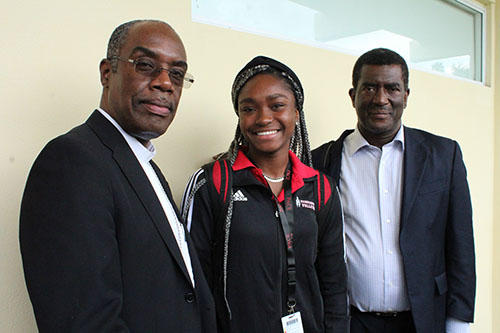
Photographer: CRISTINA CABRERA JARRO| FC
Msgr. Edward Pace High student Chesley Gachette poses with Bishop Charles Peters Barthélus of Port-de-Paix, Haiti (left), and Marc St. Louis during the bishop's visit to the school in Miami Gardens on Sept. 14, 2022.
He prayed for Haitians in the diaspora to remember their roots and continue to pray for their homeland.
HAITIAN PRESENCE
At Pace, 252 students self-identify as Haitian, according to data collected by the school’s Office of Admissions.
“But I think that number is much bigger if you consider students of Haitian descent who may not have self-identified as Haitian. The number is probably 300 to 400,” said Novela.
The number of Haitian faculty at Pace has also risen, as has the number of “honorary Haitians,” as theology teacher and Amor en Accion missionary Nelson Bonet likes to joke. Bonet and eight other faculty members, including the school’s principal, Ana Garcia, have gone on mission to Haiti.
Rose Martin, a guidance counselor for sophomores at Pace, whose parents immigrated from Haiti to the United States before she was born, said, “Pace offers knowledge about the Haitian culture, which I absolutely love. There’s missionary works, and they give Haitian students, or those of Haitian descent, the ability to relate.”
Haiti’s national motto states “L’union fait la force,” which means “Unity makes strength.” That’s how Bishop Barthélus regards the relationship between his Diocese of Port-de-Paix and Pace. “It’s an exchange from hand-to-hand,” he said. “We are praying for you because that is all we can do for you. And we are asking that you as well continue to pray for us.”
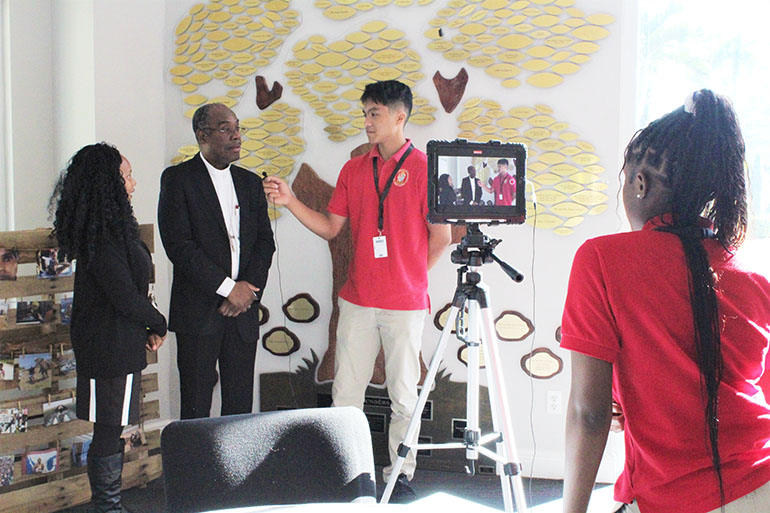
Photographer: CRISTINA CABRERA JARRO| FC
Bishop Charles Peters Barthélus, bishop of Port-de-Paix, Haiti, is interviewed at Msgr. Edward Pace High in Miami Gardens by senior Ranier Velasco for the school's Pace Broadcasting System (Pace PBS) show on Sept. 14, 2022. Behind the camera is Katiana Pierre, and assisting with translation for the bishop is Pace teacher Mammone Onelien.

